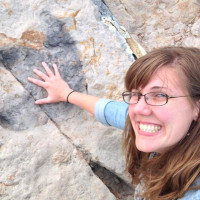
Tag: Sarah L. Sheffield

Sarah is an evolutionary palaeobiologist at the University of South Florida in Tampa. Her research involves reconstructing the evolutionary relationships of fossil echinoderms and understanding how changing climate might have influenced these evolutionary patterns. Her work is based both on studying museum collections of echinoderms and on finding new fossils in the field to add to what is known about echinoderm evolution. To do this, she travels to museums and field localities all over the world.
Sarah also works with many science-communication groups, helping bring fun and accurate science information to school-age children and interested adults. Sarah fell in love with palaeobiology when she took an elective science course in college, while she was a music major; she immediately changed her major to geology and never looked back.
When Sarah isn’t researching, she enjoys teaching college courses in palaeobiology, kayaking, hiking and spending time with her dogs, bunnies and guinea pigs.
Contact Details:
Dr Sarah L. Sheffield, The University of South Florida, Tampa, Florida, USA. ssheffield2@usf.edu

